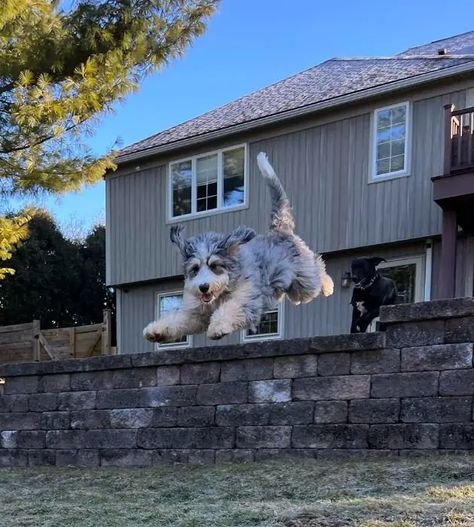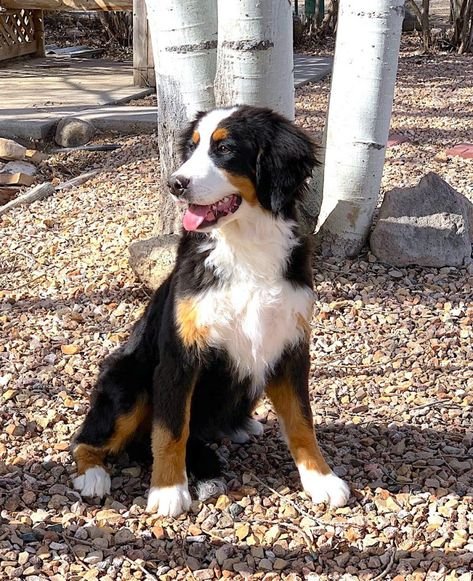The Bernedoodle is a designer dog breed that has quickly gained popularity in recent years. A hybrid between the Bernese Mountain Dog and the Poodle, this furry friend is known for its friendly disposition, hypoallergenic coat, and intelligence. In this article, we will explore everything you need to know about the Bernedoodle including its characteristics, care needs, training, and the reasons why this dog makes such a beloved companion.
Table of Contents
What Is a Bernedoodle?
The Bernedoodle is a crossbreed dog that combines the Bernese Mountain Dog, a large working breed from the Swiss Alps, and the Poodle, a highly intelligent and hypoallergenic breed. This mix results in a dog that combines the best traits of both breeds: the Bernese Mountain Dog’s loyalty and calm demeanor, and the Poodle’s intelligence and low-shedding coat.
The Bernedoodle is available in three sizes: Standard, Mini, and Tiny, depending on the size of the Poodle parent. Despite its hybrid nature, the Bernedoodle is a well-established and popular breed, thanks to its wonderful temperament and adaptability to various living situations.
Physical Characteristics of the Bernedoodle
One of the first things people notice about the Bernedoodle is its striking appearance. This breed has a strong and muscular build, inherited from its Bernese Mountain Dog parent. Its coat is often a mix of curly and wavy hair, which comes from the Poodle side, and it is generally low-shedding, making it a great option for people with allergies.
The Bernedoodle‘s coat can come in a variety of colors, including black, white, cream, and even a tri-color pattern. Some dogs may also have distinctive markings, such as a white chest or paws. This gives each Bernedoodle a unique appearance, even though they all share the same charming and endearing personality.
Bernedoodle Temperament: Friendly and Intelligent

One of the standout characteristics of the Bernedoodle is its temperament. These dogs are known for being friendly, loving, and good with families. They are often described as “gentle giants” due to their calm nature and affectionate behavior. The Bernedoodle is social and thrives on human companionship, which makes it an excellent choice for families or individuals who have the time and energy to provide them with the attention they crave.
The Bernedoodle is also very intelligent, thanks to the Poodle’s genes. Poodles are known for their problem-solving abilities, and the Bernedoodle inherits these skills. This makes them relatively easy to train, though they can also be a bit stubborn at times. Socialization and consistent training are essential to ensure that a Bernedoodle grows up to be well-mannered and well-adjusted.
Size Variations of the Bernedoodle
As mentioned earlier, the Bernedoodle comes in three different sizes: Standard, Mini, and Tiny. The size of the dog will depend largely on the size of the Poodle parent. Here’s a breakdown of the typical sizes:
- Standard Bernedoodle: The largest size, typically weighing between 70 and 90 pounds and standing 23 to 29 inches tall at the shoulder.
- Mini Bernedoodle: A smaller version, usually weighing between 25 and 49 pounds and standing 18 to 22 inches tall.
- Tiny Bernedoodle: The smallest of the bunch, typically weighing 10 to 24 pounds and standing 12 to 17 inches tall.
The Bernedoodle is versatile enough to fit various living environments, from large homes with yards to apartments, depending on its size. Mini and Tiny Bernedoodles are particularly well-suited for smaller spaces due to their compact size.
Health and Care of the Bernedoodle
Like all hybrid dogs, the Bernedoodle can inherit health issues from both of its parent breeds. While both the Bernese Mountain Dog and the Poodle are generally healthy breeds, the Bernedoodle can be prone to certain conditions such as hip dysplasia, eye problems, and allergies. It is important for potential Bernedoodle owners to be aware of these potential health issues and choose a responsible breeder who tests for common health conditions.
In terms of care, the Bernedoodle requires regular grooming to keep its coat looking its best. This breed’s low-shedding coat can become matted if not maintained, so brushing several times a week is recommended. Professional grooming every 6 to 8 weeks will also help keep the coat in top condition.
The Bernedoodle is also an active breed and enjoys exercise, though the intensity of its activity depends on its size. Regular walks, playtime, and mental stimulation through puzzle toys or training sessions will help keep a Bernedoodle happy and healthy.
Training and Socialization of the Bernedoodle
The Bernedoodle is an intelligent breed, which makes it relatively easy to train. However, it can also inherit the independent streak of the Bernese Mountain Dog, so early socialization and consistent training are key to success. Positive reinforcement methods, such as treats and praise, work best with this breed.
Start training your Bernedoodle as early as possible to prevent undesirable behaviors from developing. Basic commands like “sit,” “stay,” and “come” should be mastered first. Socialization is just as important, and exposing your Bernedoodle to various environments, people, and other dogs at a young age will help it grow into a well-rounded adult dog.
It’s also important to remember that the Bernedoodle is a social dog that thrives on human companionship. They do not like being left alone for long periods, as this can lead to separation anxiety. If you work long hours, it may be helpful to arrange for a dog walker or pet sitter to keep your Bernedoodle company during the day.
Why the Bernedoodle Makes a Great Family Pet

If you’re looking for a dog that is both affectionate and intelligent, the Bernedoodle is an excellent choice. These dogs get along well with children, making them great family pets. Their gentle nature and patience with young children are some of the qualities that endear them to families. Additionally, the Bernedoodle‘s hypoallergenic coat makes it a great option for families with allergy sufferers.
The Bernedoodle is also a good fit for families with other pets, as they are generally friendly and social. However, as with all dogs, early socialization with other animals is important to ensure smooth interactions.
Exercise Needs of the Bernedoodle
As an active breed, the Bernedoodle requires regular exercise to stay healthy and happy. While they don’t have the same high-energy levels as some other breeds, they still enjoy a daily walk, playtime, and mental stimulation. Depending on the size of the Bernedoodle, exercise needs can vary. Standard Bernedoodles may require more exercise than Mini or Tiny Bernedoodles, but all of them enjoy physical activity.
Engaging in interactive play, such as fetch or tug-of-war, can provide both physical and mental stimulation for your Bernedoodle. Puzzle toys and training sessions will also help keep them mentally sharp.
Also read Best National Parks to Visit in the US A Complete Guide
Conclusion: Is the Bernedoodle Right for You?
The Bernedoodle is a wonderful choice for those seeking a friendly, intelligent, and hypoallergenic dog. Whether you’re looking for a companion for your family, a dog to share your home, or a furry friend that will make you smile, the Bernedoodle is sure to meet your needs. With their beautiful coats, gentle personalities, and love for human interaction, these dogs make a lasting impression.
If you’re considering adding a Bernedoodle to your family, be sure to choose a responsible breeder, provide regular grooming and exercise, and offer plenty of love and attention. With the right care, your Bernedoodle will thrive and become a beloved member of your household for years to come.


